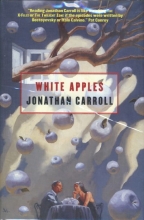White Apples
Jonathan Carroll
Tom Doherty Associates / Tor
US Hardcover First
ISBN 0-765-30388-4
Publication Date: 10-01-2002
304 Pages; $24.95
Date Reviewed: 10-31-02
Reviewed by Rick Kleffel © 2002

REFERENCES
COLUMNS
|
|
|
White ApplesJonathan CarrollTom Doherty Associates / TorUS Hardcover FirstISBN 0-765-30388-4Publication Date: 10-01-2002304 Pages; $24.95Date Reviewed: 10-31-02Reviewed by Rick Kleffel © 2002 |
|
|
REFERENCES |
COLUMNS |
Death is so romantic. Life after death is to die for. In 'White Apples', Jonathan Carroll re-invents the romance novel as a witty romp through a reality so magical that even Houdini would have a hard time keeping up. Carroll's bon-vivants and wise-cracking wastrels cut a swath weird enough that readers will need to restock their supplies of uh-ohs. With a skill that will impress even those who find the novel unutterably odd, Carroll asks the Big Questions, and after a whirlwind holiday in the world capitals of culture, he answers them with debonair flair. Through every carefully chosen word, he conveys a lust for life that would shock Iggy Pop. And just when the reader is getting accustomed to Carroll's latest enhancement of reality, the author slides a new one out of his sleeve like a Las Vegas magician. His characters are cads, but their conversations are the best eavesdropping you're going to find between any printed pages.
Carroll's novels are not best served by a plot summary, and I'm not going to bother with one in this review. Life, death and love -- order and chaos. And more love. For those who have not read Carroll's work, 'White Apples' is a reasonable place to start. However his characters could be off-putting to some readers. Vincent Ettrich is a genial, serial philanderer who has ended his marriage and is in a new relationship. He's charming and good-looking, like just about everyone else in this novel. He's the kind of character that readers are often directed by writers to dislike. But Carroll invests him with a rich wit and the kind of conversational zingers that readers dream they can come up with. It lands him women like Coco, the Audrey Hepburn-like gal who runs a lingerie store, Isabelle, the love of his life, a spoiled blonde who is pregnant with his child, and Kitty, his ex-wife, mother of his first two children. It's a pretty complicated soap-opera setup but it's written with the kind of insight into characters that illuminates the work of better known writers like Nick Hornby.
Then things get weird. Carroll has an incredible talent for moving sublimely from cosmopolitan banter to cosmic complications. The living are dead, the dead are living, the past, the present and the future are all wound together as tightly in this novel as they are in the reader's mind. Most importantly, Carroll enables his characters to make the same kinds of cross-connections between them that the readers can make in their own memories. For some readers, the uh-oh factor may become a bit high. And just when you think that Carroll is going to keep the novel entirely, delightfully light, he drops in a dollop of darkness that's as chilling as his conversations are charming. The temptation to shelve this and other Carroll novels with science fiction is understandable. He evokes the same sense of wonder as the best science fiction, but he operates in a completely different sphere. Carroll uses analogy, not technology, to open the reader's mind to thoughts it never considered containing. When Carroll answers those Big Questions, you may not exactly agree with his answers, but they are inevitably very damned clever.
Carroll is a remarkably skilled prose writer. He writes the kind of phrases that readers want to make a point of remembering. The novels are so smart that they seem like a big load of really good advice from someone who expresses himself extremely well. This is the kind of novel that readers will want to quote from, or read aloud to their lovers.
"Patience never wants Wonder to enter the house: because Wonder is a wretched guest. It uses all of you but is not careful with what is most fragile or irreplaceable. If it breaks you, it shrugs and moves on. Without asking, Wonder often brings along dubious friends: doubt, jealousy, greed. Together they take over; re-arrange the furniture in every one of your rooms for their own comfort. They speak odd languages but make no attempt to translate for you. They cook strange meals in your heart that leave odd tastes and smells. When they go are you happy or miserable? Patience is always left holding the broom."
If you get this book as a gift, it's because someone likes you a lot.
'White Apples' could very well mark the big-time debut of Carroll's new genre, the urbane supernatural romance. The opening sequence offers Grant-Hepburn wit in an utterly modern setting. He manages to keep the focus crystal clear while sliding away the background of a static reality and replacing it with his character-driven dynamic reality. He can capture the first sweep of love and the last breath of loss. 'White Apples' paints a peculiar, poignant picture of love with cosmic consequences.